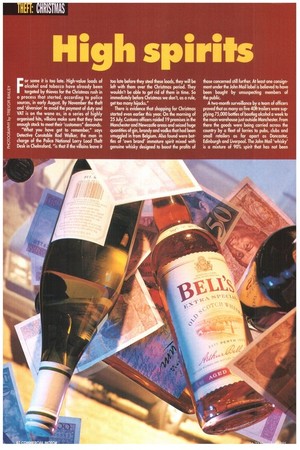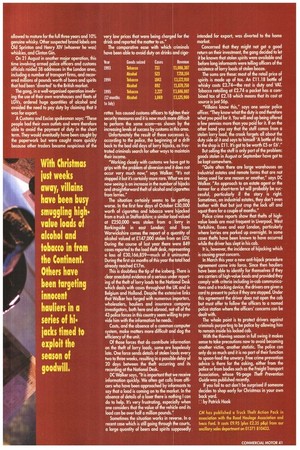High spirits
Page 42

Page 43

If you've noticed an error in this article please click here to report it so we can fix it.
For some it is too late. High-value loads of alcohol and tobacco have already been targeted by thieves for the Christmas rush in a process that started, according to police sources, in early August. By November the theft and 'diversion' to avoid the payment of duty and VAT is on the wane as, in a series of highly organised hits, villains make sure that they have enough stock to meet their 'customers" demands.
"What you have got to remember," says Detective Constable Rod Walker, the man in charge of the Police National Lorry Load Theft Desk in Chelmsford, "is that if the villains leave it too late before they steal these loads, they will be left with them over the Christmas period. They wouldn't be able to get rid of them in time. So immediately before Christmas we don't, as a rule, get too many hijacks."
There is evidence that shopping for Christmas started even earlier this year. On the morning of 25 July, Customs officers raided 19 premises in the Manchester and Newcastle areas and seized huge quantities of gin, brandy and vodka that had been smuggled in from Belgium. Also found were bottles of 'own brand' immature spirit mixed with genuine whisky designed to boost the profits of those concerned still further. At least one consignment under the John Mail label is believed to have been bought by unsuspecting members of the public. A two-month surveillance by a team of officers proved that as many as five 40ft trailers were supplying 75,000 bottles of bootleg alcohol a week to the main warehouse just outside Manchester. From there the goods were being carried across the country by a fleet of lorries to pubs, clubs and small retailers as far apart as Doncaster, Edinburgh and Liverpool. The John Mail 'whisky' is a mixture of 90% spirit that has not been
allow .. to mature for the full three years and 10% genuin whisky. Other suspected brand labels are Old Sp inton and Henry XIV (whoever he was) wh iski s, and Clinton Gin.
On .1 August in another major operation, this time in olving armed police officers and customs official raided 38 addresses in the London area, includi g a number of transport firms, and recovered m I lions of pounds worth of beers and spirits that ha. been 'diverted' to the British market.
The tang, in a well-organised operation involving the use of their own warehouses and fleets of LGVs, .rdered huge quantities of alcohol and avoid • the need to pay duty by claiming that it was fo export.
A C storm and Excise spokesman says: "These people had their own outlets and were therefore able t. avoid the payment of duty in the short term. T .y would eventually have been caught by the pa. -rwork but were caught more quickly becausother traders became suspicious of the
very low prices that were being charged for the drink and reported the matter to us." The comparative ease with which criminals have been able to avoid duty on drinks and tiga
mites has caused customs officers to tighten their security measures and it is now much more difficult to perform the same scam—as shown by the increasing levels of success by customs in this area.
Unfortunately the result of these successes is, according to the police, the beginning of a drift back to the bad old days of lorry hijacks, as frustrated criminals search for other ways to maintain their income.
"Working closely with customs we have got to grips with the problem of diversion and it does not occur very much now," says Walker. "It's not slopped it but ifs certainly more rare. What we are now seeing is an increase in the number of hijacks and straightforward theft of alcohol and cigarettes from lorries."
The situation certainly seems to be getting worse. In the first few days of October 00,000 worth of cigarettes and tobacco were hijacked from a truck in Staffordshire; a similar load valued at £250,000 was stolen from a lorry in Barkingside in east London; and from Warwickshire comes the report of a quantity of alcohol valued at £147,000 stolen from an LGV. During the course of last year there were 849 cases reported to the load theft desk, representing a loss of 00,166,859—much of it uninsured, During the first six months of this year the total had already reached E17m. This is doubtless the tip of the iceberg. There is clear anecdotal evidence of a serious under reporting of the theft of lorry loads to the National Desk which deals with cases throughout the UK and in Belgium and Holland. Despite the extensive links that Walker has forged with numerous importers, wholesalers, hauliers and insurance company investigators, both here and abroad, not all of the 43 police forces in this country seem willing to provide him with the information he needs.
Costs, and the absence of a common computer system, make matters more difficult and dog the efficiency of the unit, Of those forces that do contribute information on the theft of lorry loads, some are hopelessly late. One force sends details of stolen loads every two to three weeks, resulting in a possible delay of 20 days between the theft occurring and its recording at the National Desk. DC Walker says, "It is important that we receive information quickly. We often get calls from officers who have been approached by informants to say that a load is coming on to the market. In the absence of details of a loser there is nothing I can do to help. It's very frustrating, especially when one considers that the value of the vehicle and its load can be over half a million pounds." Sometimes the situation works in reverse. In a recent case which is still going through the courts, a large quantity of beers and spirits supposedly intended for export, was diverted to the home market.
Concerned that they might not get a good return on their investment, the gang decided to let it be known that stolen spirits were available and before long informants were telling officers of the existence of lorry loads of stolen booze.
The sums are these: most of the retail price of spirits is made up of tax. An £11.18 bottle of whisky costs 0.74—the rest is duty and VAT. Tobacco retailing at E2.74 a packet has a combined tax of £2.18 which means that its cost at source is just 56p.
"Villains know this," says one senior police officer. "They know what the duty is and therefore what you paid for it. You will end up being offered a few pennies more than you paid for it. If on the other hand you say that the stuff comes from a stolen lorry load, the crook forgets all about the
duty side of it and says to himself 'A bottle of this in the shop is £11. It's got to be worth £5 or £6`." But selling the stuff is only part of the problem: goods stolen in August or September have got to
be kept somewhere. "Quite often there are large warehouses on industrial estates and remote farms that are not being used for one reason or another," says DC
Walker. "An approach to an estate agent or the farmer for a short-term let will probably be suc cessful, particularly if the story is right. Sometimes, on industrial estates, they don't even bother with thot but just crop the lock off and squat there for a couple of months."
Police crime reports show that thefts of highvalue loads are most frequent in Liverpool, West Yorkshire, Essex and east London, particularly where lorries are parked up overnight. In some cases thefts have been known to have occurred while the driver has slept in his cab. It is, however, the incidence of hijacking which is causing great concern. In March this year a new anti-hijack procedure agreement came into force. Since then hauliers have been able to identify for themselves if they are carriers of high-value loads and provided they comply with criteria including in-cab communica tions and a tracking device, the drivers are given a card to present to police if they are stopped. Under this agreement the driver does not open the cab
but must offer to follow the officers to a named police station where the officers' concerns can be dealt with.
The whole point is to protect drivers against criminals purporting to be police by allowing him to remain inside his locked cab.
With the thieving season in full swing it makes sense to take precautions now to avoid becoming another victim, another statistic. The police can
only do so much and it is no part of their function to spoon-feed the unwary. Free crime prevention advice is there for the asking, either from the police or from bodies such as the Freight Transport Association, whose 96-page Theft Prevention Guide was published recently. If you fail to act don't be surprised if someone decides to shop early for Christmas in your own back yard.
— by Patrick Hook
CM has published a Truck Theft Action Pack in association with the Road Haulage Association and Iveco Ford. It costs £9.95 (plus £2.35 p&p) from our ancillary sales deportment on 01371 810433.




























































































































